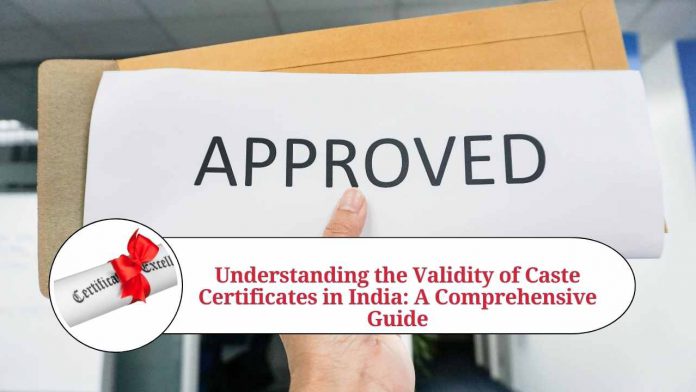The Validity of Caste Certificate in India: A Comprehensive Guide
India is a country with a diverse population, comprising of various castes and communities. The Indian Constitution recognizes the importance of caste-based representation and reservation in education and employment. Caste certificates are issued by the government to identify a person’s caste, and they serve as proof of belonging to a particular community. However, the validity of caste certificates has been a topic of discussion and debate in India. In this blog, we will discuss the validity of caste certificates in India, along with the laws and regulations governing them.
What is a Caste Certificate?
A caste certificate is a legal document issued by the government to certify a person’s caste or community. It serves as proof of belonging to a particular caste or community, and it is required for availing reservation benefits in education, employment, and other government schemes. The certificate is issued by the district administration or sub-divisional magistrate of the respective state, and it is valid for a lifetime.
Laws Governing Caste Certificates
The validity and issuance of caste certificates are governed by various laws and regulations in India. The following are some of the important laws and regulations governing caste certificates in India:
- The Constitution of India: The Constitution of India recognizes the importance of caste-based representation and reservation in education and employment. Article 15(4) and Article 16(4) of the Constitution provide for reservation of seats in educational institutions and government jobs for socially and educationally backward classes.
- The Scheduled Castes and Scheduled Tribes (Prevention of Atrocities) Act, 1989: This act provides for the prevention of atrocities against members of scheduled castes and scheduled tribes. It also provides for the punishment of those who impose false caste identities on members of these communities.
- The National Commission for Scheduled Castes: The National Commission for Scheduled Castes was established in 2004 to safeguard the rights and interests of members of scheduled castes. It also ensures that members of these communities are not discriminated against in any form.
Validity of Caste Certificates
The validity of caste certificates is a matter of concern, as some people have been found to obtain fake certificates to avail of reservation benefits. In 2018, the Supreme Court of India held that caste certificates obtained by candidates using false means cannot be treated as valid, and such candidates would lose their reserved seats. The court also held that if a person is found to have obtained a fake caste certificate, they could be criminally prosecuted and sentenced to imprisonment.
It is essential to note that the validity of caste certificates does not depend on the caste of the issuing authority. Any authorized government official can issue a caste certificate if the applicant meets the criteria set by the government. The criteria for issuing caste certificates vary from state to state, but generally, the applicant must provide proof of their caste, such as a birth certificate or a ration card.
Obtaining a caste certificate in India involves a specific process that varies from state to state. Here is a general outline of the steps involved in obtaining a caste certificate:
- Application: The first step is to obtain the application form for a caste certificate. The form can be obtained either online or from the local district administration office. The applicant needs to fill in the required details such as name, address, caste, and other relevant information.
- Supporting Documents: Along with the application form, certain supporting documents need to be submitted. These may include a proof of identity (such as Aadhaar card or voter ID), proof of residence (such as a utility bill or ration card), and proof of caste (such as a birth certificate, school records, or caste certificate of parents or relatives).
- Verification: Once the application and supporting documents are submitted, the concerned authorities verify the authenticity of the information provided. They may conduct an inquiry or visit the applicant’s residence to confirm the details.
- Scrutiny Committee: In some states, there is a scrutiny committee responsible for scrutinizing the caste certificate applications. The committee reviews the application and documents and ensures that the applicant meets the criteria set by the government for belonging to a specific caste or community.
- Issuance of Certificate: If the application is approved, the caste certificate is issued by the district administration or sub-divisional magistrate. The certificate usually contains details such as the applicant’s name, caste, date of issuance, and a unique identification number.
Challenges and Controversies
The validity and misuse of caste certificates have been subjects of challenges and controversies in India. Some of the challenges include:
- False Certificates: Instances of individuals obtaining fake caste certificates to avail reservation benefits have been reported. This not only undermines the purpose of caste-based reservation but also deprives deserving candidates from backward communities of their rightful opportunities.
- Caste Frauds: There have been cases where individuals falsely claim to belong to a specific caste or community to gain advantages in education, employment, or other government schemes. This leads to the dilution of benefits meant for socially and educationally backward classes.
- Verification Issues: The verification process for caste certificates can sometimes be challenging. Authorities face difficulties in ensuring the authenticity of the documents submitted and confirming the applicant’s caste or community status.
- Casteism and Discrimination: Despite the reservation system and caste certificates, instances of caste-based discrimination still persist in various sectors of society. These discriminatory practices continue to hinder social progress and equality.
Government Initiatives and Remedies
To address the challenges and controversies surrounding caste certificates, the government has taken several initiatives and introduced remedies:
- Digitization: Many states have initiated the digitization of caste certificates to ensure better management, transparency, and ease of verification. Online application processes and digital records help reduce the chances of fraud and manipulation.
- Strict Actions: The government has emphasized taking strict actions against those found guilty of obtaining fake caste certificates. Legal provisions are in place to prosecute individuals involved in such malpractices, including cancellation of reservation benefits and criminal penalties.
- Awareness and Sensitization: The government and social organizations conduct awareness campaigns and sensitization programs to educate people about the importance of caste certificates, the reservation system, and the consequences of fraudulent practices.
- Improved Verification Processes: Efforts are being made to enhance the verification process for caste certificates. This includes deploying trained officials, conducting thorough investigations, and cross-checking the submitted documents with other relevant databases.
Conclusion
Caste certificates are crucial documents that ensure representation and affirmative action for socially and educationally backward classes in India. While the validity and misuse of caste certificates pose challenges, the government has implemented various measures to address these issues.
Read more useful content:
Frequently Asked Questions (FAQs)
What is a caste certificate?
A caste certificate is a legal document that certifies an individual’s caste or community status as per the government records. It is issued by the district administration or sub-divisional magistrate to provide affirmative action and representation to socially and educationally backward classes.
Who can apply for a caste certificate?
Any individual who belongs to a socially and educationally backward class as per the government records can apply for a caste certificate.
What documents are required to obtain a caste certificate?
The documents required to obtain a caste certificate may vary from state to state. Generally, applicants need to provide proof of identity, proof of residence, and proof of caste, such as birth certificates, school records, or certificates of relatives.
How long does it take to obtain a caste certificate?
The time required to obtain a caste certificate varies from state to state and depends on the verification process. Generally, it may take a few weeks to a few months to obtain a caste certificate.
Can a caste certificate be obtained online?
Many states in India have an online application process for obtaining a caste certificate. Applicants can fill in the required details and upload the necessary documents online.
What is the validity of a caste certificate?
The validity of a caste certificate varies from state to state. Generally, it is valid for a period of five years from the date of issuance.
Can a caste certificate be renewed?
Yes, a caste certificate can be renewed after its validity period expires. The renewal process may require submitting fresh documents and going through the verification process again.
Can a caste certificate be cancelled?
Yes, a caste certificate can be cancelled if it is found to be obtained through fraudulent means or misrepresentation of facts.
What are the benefits of a caste certificate?
A caste certificate provides affirmative action and representation to socially and educationally backward classes. It enables individuals to avail of government schemes, education and employment opportunities, and reservation benefits.
Is it illegal to use a fake caste certificate?
Yes, it is illegal to use a fake caste certificate to avail of government benefits meant for socially and educationally backward classes. It can lead to legal consequences, cancellation of benefits, and penalties.




















